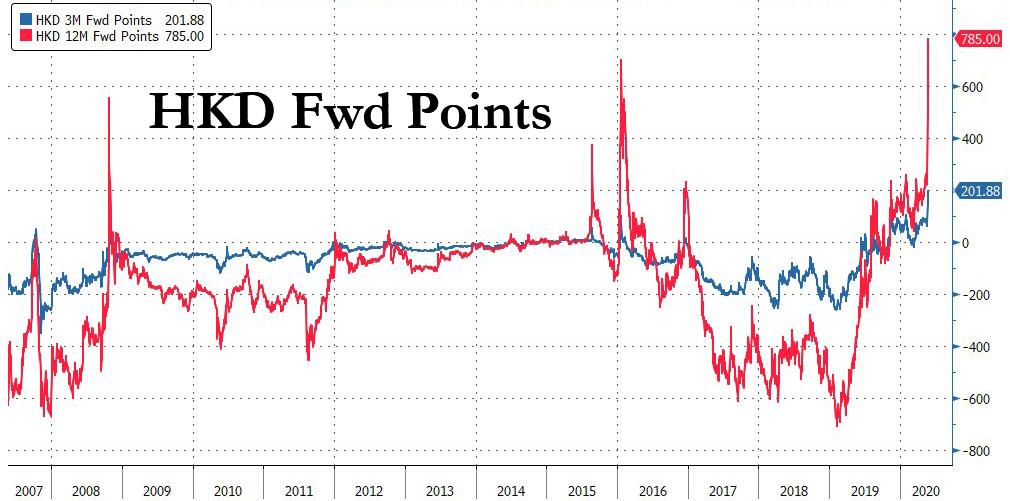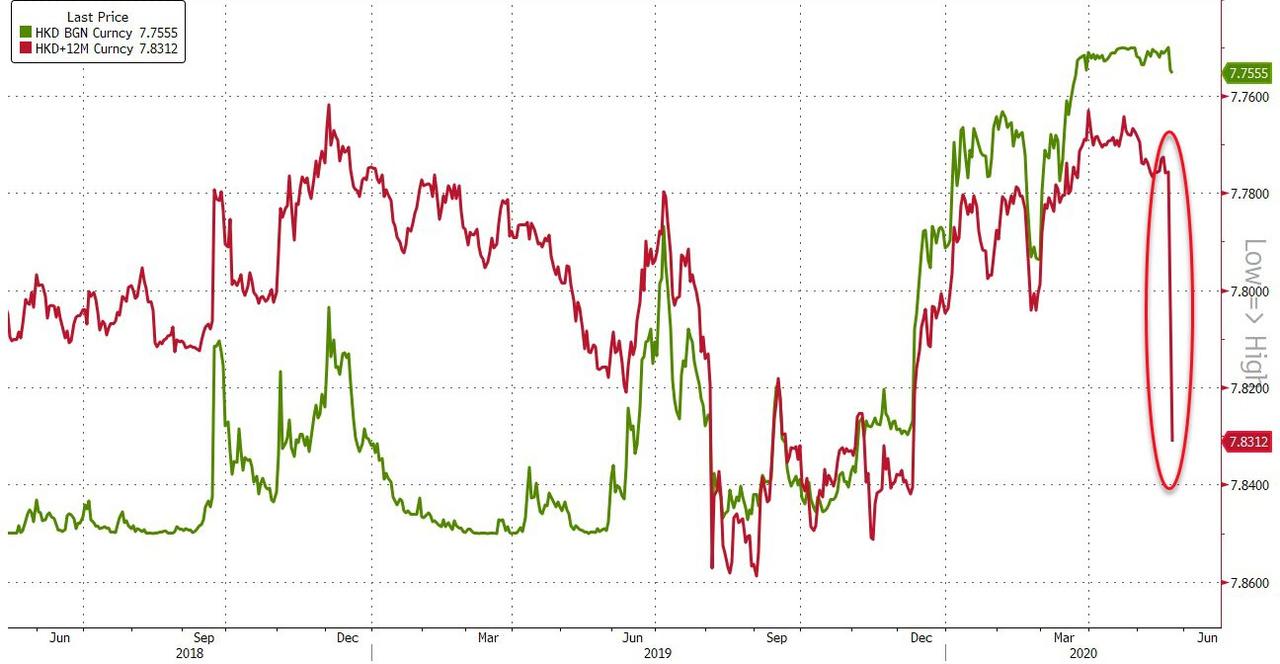FX Traders Brace For Crisis As Hong Kong Dollar Forwards Explode To Record Highs
Tyler Durden
Fri, 05/22/2020 – 10:55
Hong Kong dollar traders are bracing for a crisis, pricing in an unprecedented squeeze in liquidity, with a gauge tracking the demand for cash jumping to the highest level on record. On Friday, HKD 3- 12-month forward points surged above 200 and 785, respectively, the latter soaring by a record 300bps, showing that the supply of cash in the foreign-exchange market is expected to collapse. Of note, forward points have spiked above all time highs, surpassing levels seen during the financial crisis.
The move was sparked by the widely reported news overnight that China is now set to establish a set of laws related to HK national security. Spot HKD is weaker and implied volatility is higher, but marginally compared to the spike in points, which suggest a major move in the underlying currency.
As SocGen’s FX strategist Jason Daw writes, the move in forward points is related to the markets’ concern about two possible scenarios:
-
resumption of heightened domestic tensions in Hong Kong and
-
even greater international tensions, which were previously simmering related to trade wars, as the market awaits the US response (legislation was proposed overnight to punish Chinese entities involved in enforcing the security measures and banks that do business with them; there is also the lingering risk of the US stripping Hong Kong of its special status; or other retaliatory measures).
While the market reaction appears justified, Daw notes that with the HKD it is important to differentiate between fundamental and speculative drivers in spot and forwards.
On the fundamental side, a major driving force for HKD spot and swap points over medium term cycles is US rates. Amid Fed easing and stable US rates at low levels, relatively tighter HKD liquidity translates into positive swap points. Prior to this move, points were already looking a bit high but speculative activity has pushed them higher than warranted by US rate fundamentals.
At the same time, it is important to remember that the implications for HKD spot is very different than in 2019 when tensions pushed the currency to the weak side of the convertibility range. Last year investors were paid to short HKD but this year it is negative carry (and growing). This means that continued low US rates should anchor spot in the lower half of the convertibility band.
As a result, SocGen believes that the chance of change in the HKD currency regime is negligible, for now.
A different view emerges from the actual market, where as Bloomberg’s Mark Cranfield notes, USDHKD options and forwards have woken up from their recent slumber, with option volumes on Thursday more than double the 5-day average, with 7.85 options attracting the most attention, suggesting a surge in bets the HKD will hit the upper end of the band. In the options space the largest 7.85 strikes have a 1-year maturity.
Should Hong Kong equities have a rough Friday in response to China’s proposed security laws, there could be further demand for HKD options. Especially outside of Asia where most of the biggest HKD bears appear to congregate. As MLIV noted last month, it was only a matter of time before traders’ attention would switch back to 7.85.
As SocGen adds, while FX swap points are high on a historical basis, they could easily push much higher over the coming weeks as US-China tensions escalate. 12m forward outright rising to the levels in mid-2019 (7.85- 86), implying points at 1000-1200, is not inconceivable, and as such “selling points is on the wrong side of the tail risk and is not recommended until political risks subside.”
Of course, what happens next will depend on the severity of the US response to the Chinese imposition of the national security law, and reciprocally, what China does then, and so on, although residents of Asia’s (former) financial mecca may not wait to see the outcome: as Rabobank’s Michael Every said earlier, “the fact that Beijing is prepared to push ahead with such a step knowing what the response will be, and what that could mean for Hong Kong –and for US relations with Taiwan– should be of deep concern to markets.”

